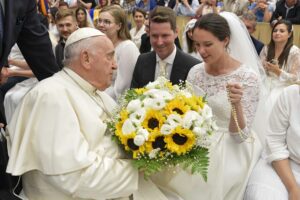VATICAN CITY (CNS) – Pope Francis’ emphasis on God’s mercy and on pastoral outreach to Catholics who felt pushed to the edges of the Catholic community marked a new, and often controversial, approach to the family and sexuality during his pontificate.
In the Catholic Church there is room for “todos, todos, todos” – everyone, everyone, everyone – he often said.
He tried to explain what he meant in an Italian television interview in November 2023: “When I say ‘everyone, everyone, everyone,’ it’s the people. The church receives people, everyone, and does not ask what you are. Then, within the church, everyone grows and matures in their Christian belonging.”

Pope Francis encouraged pastors to welcome divorced and civilly remarried Catholics into parish life and simplified the process couples needed to go through to obtain an annulment of their first union.
And during his first inflight news conference, returning to Rome from World Youth Day in Rio de Janeiro in 2013, he famously said, “If someone is gay and is searching for the Lord and has goodwill, then who am I to judge him?”
Throughout his pontificate he met with and encouraged LGBTQ+ Catholics and those who minister with them. And regularly since 2022, Sister Geneviève Jeanningros, a member of the Little Sisters of Jesus, brought transgender people to meet the pope at his weekly general audiences.
In 2023, he told an interviewer from the Argentine website Perfil that “everyone is a child of God, and each one seeks and finds God by whatever path he or she can.”
While the pope insisted matrimony can only be between one man and one woman, he also repeated his support for the legal rights guaranteed by civil unions for gay couples and others who share a life. And he said, as he told The Associated Press earlier that year, homosexuality should not be criminalized.
Catholic teaching says that homosexual acts are sinful, like any sexual activity outside of marriage, but Pope Francis told Perfil he did not think those sins would send a person to hell.
“God only sets aside the proud, the rest of us sinners are all in line,” he said, and God always is reaching out to save sinners who seek his help.
In a memoir published in 2024, the pope said the church must act as a mother, “who embraces and welcomes everyone, even those who feel they are in the wrong and have been judged by us in the past. I think, for example, of homosexuals and transsexuals who seek the Lord but are rejected or persecuted.”
The Gospel mission of proclaiming God’s love to all, he said, is the foundation of the approval he gave in December 2023 to the Dicastery for the Doctrine of the Faith’s publication of “Fiducia Supplicans” (“Supplicating Trust”), which allows Catholic priests to bless a same-sex or other unmarried couple. However, it cannot be a formal liturgical blessing, nor give the impression that the church is blessing the union as if it were a marriage.
In a message in April 2023 to a conference on the Billings Method of natural family planning, the pope called for a more serious reflection on human sexuality.
Specifically, he said, there is a “need for education in the value of the human body, an integrated and integral vision of human sexuality, an ability to cherish the fruitfulness of love even when not fertile, the building up of a culture that welcomes life and ways to confront the problem of demographic collapse.”
Pope Francis frequently mentioned his concern about falling birthrates, particularly in Europe, and praised communities that were going against the trend.
Visiting the French island of Corsica in December (2024), the pope commented on the many children he saw during his one-day trip, saying the only place he had seen more kids was during his trip to Timor-Leste two months earlier.
“Have children, have children,” he told Corsicans, “this will be your joy and your glory.”
Pope Francis was a regular speaker at an annual conference in Rome sponsored by groups trying to reverse Italy’s steeply declining birthrate.
“Human life is not a problem, it is a gift,” he told the conference in 2024. “The problem is not how many of us there are in the world, but what kind of world we are building.”
At the same time, Pope Francis did not encourage people to have as many children as they possibly could.
During an inflight news conference returning to Rome from the Philippines in 2015, Pope Francis noted that for a marriage to be valid, the bride and groom must be open to having children. St. Paul VI’s teaching against artificial birth control in “Humanae Vitae” was a logical consequence of that teaching, he said.
“This doesn’t mean that a Christian should have a succession of children,” he said. “Some people believe that — pardon my language — in order to be good Catholics, we should be like rabbits. No. Responsible parenthood” is needed.
But he also insisted that it is not for someone else to judge that, for example, a poor couple is irresponsible for having many children. “We also need to consider the generosity of those fathers and mothers who see in every child a treasure.”
